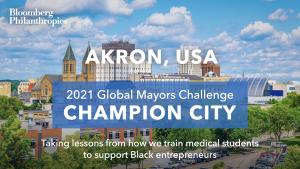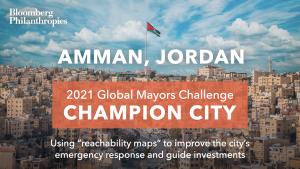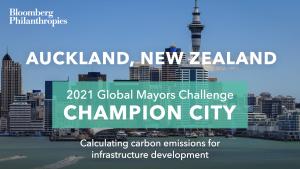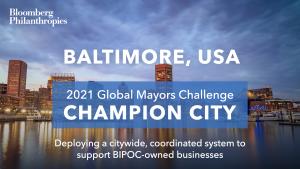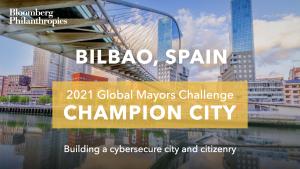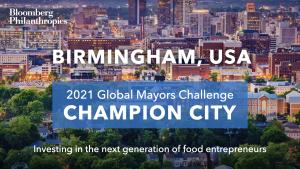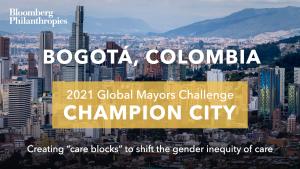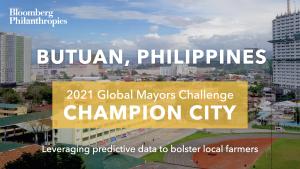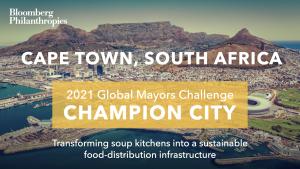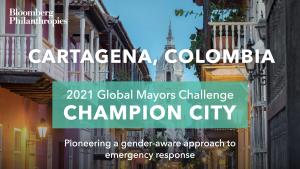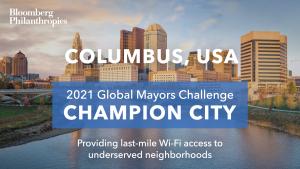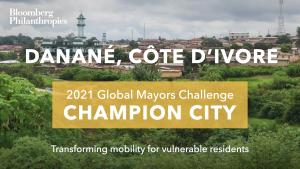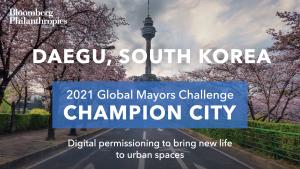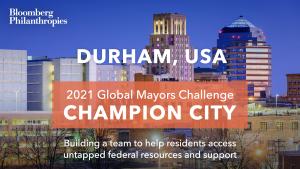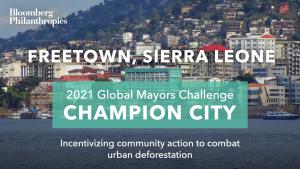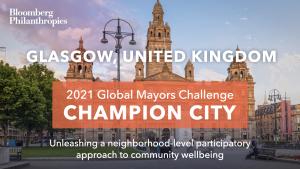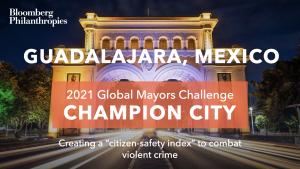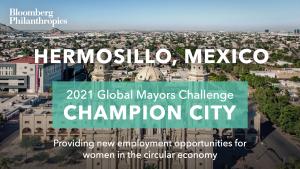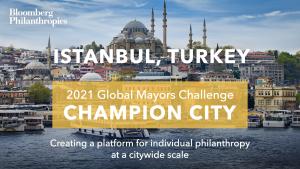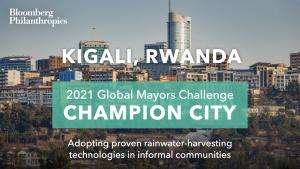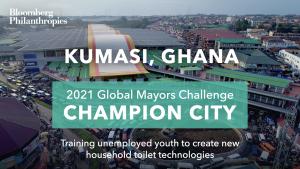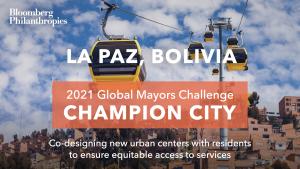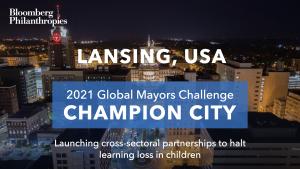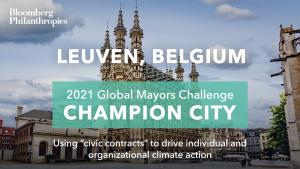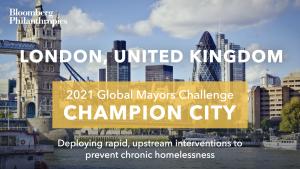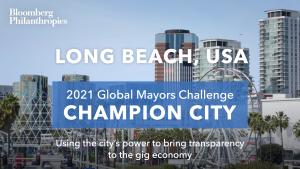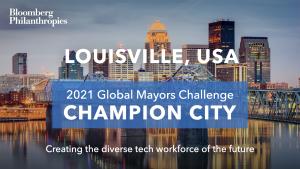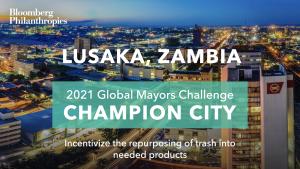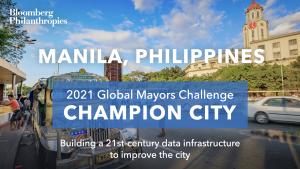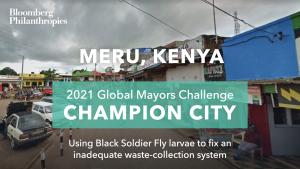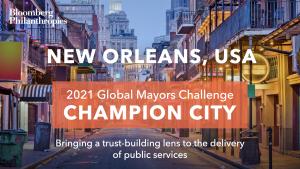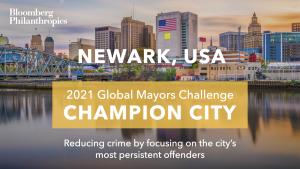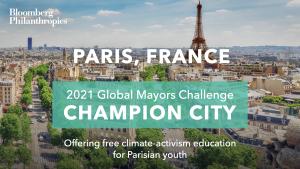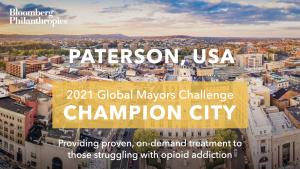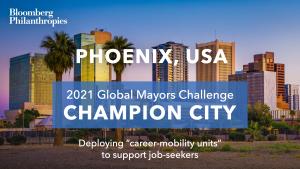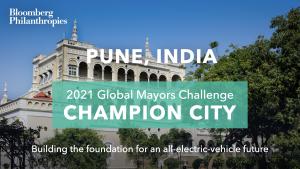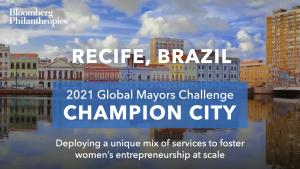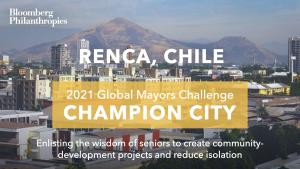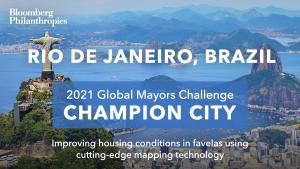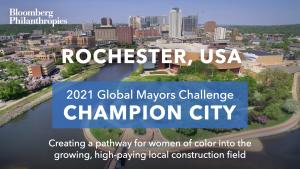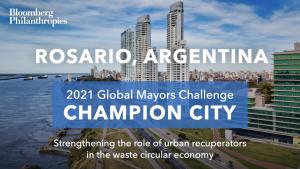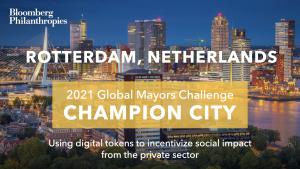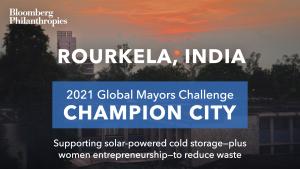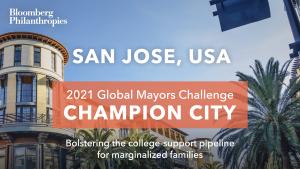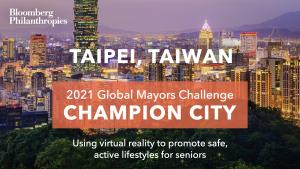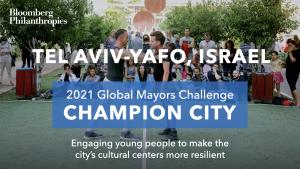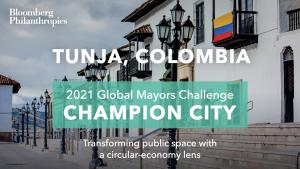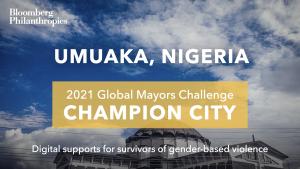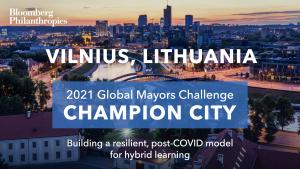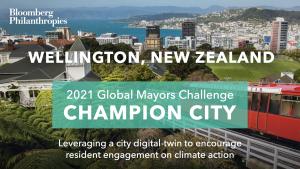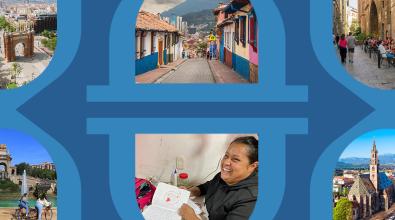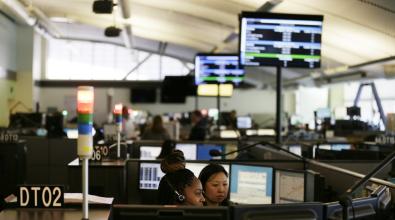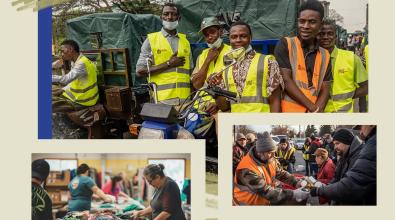Mayors Challenge: Announcing this year’s 50 Champion Cities
Bloomberg Philanthropies today announced the 50 Champion Cities, representing the boldest urban innovations of the past year, that will advance to the finalist stage of the 2021 Global Mayors Challenge, a worldwide competition that encourages and spreads cities’ most promising ideas. This year’s Challenge focuses on elevating the most important innovations generated in response to the global COVID-19 pandemic.
The 50 cities named today hail from 29 nations on six continents. They emerged from a highly competitive applicant pool: Mayors from 631 cities in 99 countries submitted their most promising ideas for consideration. That’s twice the number of cities that applied in Bloomberg Philanthropies’ last Mayors Challenge, held in the United States in 2018. The finalists were elevated based on four criteria: vision, potential for impact, feasibility, and transferability.
The ideas provide a powerful snapshot of the innovation priorities of the world’s cities. At the global level, approaches focusing on improving health and reducing unemployment were most common. Racial justice emerged as the area of highest priority for U.S. cities, while social inclusion topped the European submissions. In Africa, where the world is experiencing its fastest rates of urbanization, infrastructure was dominant. Nearly half of the submissions were generated in part through participatory processes with residents.
“These 50 finalists are showing the world that, in the face of the pandemic’s enormous challenges, cities are rising to meet them with bold, innovative, and ambitious ideas,” said Michael R. Bloomberg, founder of Bloomberg LP and Bloomberg Philanthropies and 108th mayor of New York City. “By helping these cities test their ideas over the coming months, we will have a chance to identify cutting-edge policies and programs that can allow cities to rebuild in ways that make them stronger and healthier, and more equal and more just.”
The Champion Cities and their standout innovations are:
Akron | Amman | Auckland | Baltimore | Bilbao | Birmingham | Bogotá | Butuan | Cape Town | Cartagena | Columbus | Danané | Daegu | Durham | Freetown | Glasgow | Guadalajara | Hermosillo | Istanbul | Kigali | Kumasi | La Paz | Lansing | Leuven | London | Long Beach | Louisville | Lusaka | Manila | Meru | New Orleans | Newark | Paris | Paterson | Phoenix | Pune | Recife | Renca | Rio de Janeiro | Rochester | Rosario | Rotterdam | Rourkela | San Jose | Taipei | Tel Aviv-Yafo | Tunja | Umuaka | Vilnius | Wellington
Akron, USA
Akron's Black residents make up 30 percent of the city's population, yet own only 0.5 percent of local businesses, contributing to stark income inequality. The city is proposing to launch 200 new Black-owned businesses by pairing entrepreneurs with a mentor-navigator, who will guide them through a suite of financial support and expert resources. Akron’s idea takes the "medical rounds" model from how we educate doctors and applies it to business training.
Amman, Jordan
Amman was not prepared to deliver essential services, such as food and healthcare, to all local communities during the COVID-19 lockdown, because it lacked an awareness of its key community assets. The city created "reachability maps" to identify gaps in key services—and now proposes expanding the project to improve response to future emergencies and to better prioritize infrastructure investments in local communities.
Auckland, New Zealand
Auckland seeks to reach net-zero greenhouse-gas emissions by 2050 while continuing to meet the needs of a rapidly growing city, including the need to fill critical gaps in infrastructure. The city is proposing a new, universal tool to measure the carbon footprint of new infrastructure projects, so that they can pursue new development while staying on track to meet ambitious climate goals. Auckland’s idea is important because, by some estimates, 75 percent of the infrastructure that will be built by the year 2050 does not exist today, and up to 11 percent of carbon emissions worldwide can be classified as embodied carbon emissions.
Baltimore, USA
Baltimore's Black, Indigenous, and people of color (BIPOC)-owned businesses were disproportionately impacted by COVID-19, yet they are 40 percent less likely than white-owned businesses to access federal assistance. The city launched a new network of 19 local organizations that will assist these businesses to recover and thrive.
Bilbao, Spain
Bilbao provides free Wi-Fi to residents, which makes its network more vulnerable to malicious software and cyberattacks. The city is proposing a new municipal capacity that identifies and blocks online threats, alerts citizens of risks, and educates the public on cybersecurity. Bilbao’s idea stands out because it represents an emerging understanding that, as cities increase residents' digital access, they must also protect that access and, in doing so, build trust.
Birmingham, USA
Nearly 70 percent of Birmingham residents live in neighborhoods that lack access to quality, affordable fresh foods. The city is proposing to create the Birmingham Food Corps, staffed by recent graduates of city schools, to scale the success of their hyper-local urban farms and generate new creative, community-driven solutions for increased food access. This idea stands out because of the wide range of new solutions that could potentially be generated by the Food Corps program, with lessons to share with cities tackling food-security issues elsewhere.
Bogotá, Colombia
In Bogotá, the unpaid care burden falls disproportionately on women; as a result of COVID-19 closures, 30 percent of the city's female population do unpaid caregiving full-time. The city is proposing "care blocks" to support caregivers, reduce women's unpaid care work, and redistribute care more equitably by training men to do household chores. Bogotá’s idea stands out because it would be the first city-level care system of its kind—and because it explicitly confronts existing gender norms around care with an eye toward equity.
Butuan, Philippines
Butuan faces high rates of hunger and food insecurity, in part because of its struggles around local food production. The city will fine-tune an ineffective agricultural market by giving farmers predictive data to make better decisions about the type and amount of crops to plant, and fix some commodity prices to reduce risk on vegetables and high-demand foods. This idea is compelling because of the ambitious goals the city believes it could achieve in the short term through this initiative, including but not limited to: increasing vegetable production from 19 percent of need in 2020 to 150 percent by 2023, increasing farmers’ income by 50 percent and reducing the average vegetable retail price by 50 percent.
Cape Town, South Africa
Across South Africa, the number of people experiencing hunger has doubled as a result of the pandemic, and Cape Town is facing a hunger crisis. The city has quickly leveraged the existing network of small, community-run soup kitchens and is providing new equipment and resources to enable them to reach as many residents as possible and improve food security. The idea is compelling because the city has been able to gather myriad learnings through its initial pilot, and because of the high level of community ownership of the program.
Cartagena, Colombia
Cartagena has uncoordinated and data-poor emergency-response systems, which are ineffective at delivering crisis support to women, particularly victims of gender-based violence or climate-related emergencies in under-invested communities. The city is proposing to empower community actors as first responders, utilizing new technologies to help them collect data, and deliver training to respond to a wide range of emergencies. This idea is compelling because of the persistent problem of gender-based violence in Latin America, where data regarding women's health is often difficult to find and dealt with under the broader banner of "women's services."
Columbus, USA
Columbus faces an increasing digital-divide challenge, and one in four students were unable to fully participate in class when schools shifted to remote learning as a result of COVID-19. The city is proposing to expand last-mile wireless access to homes that are currently underserved by installing base stations on city buildings. The idea is compelling because it integrates digital literacy support for residents alongside technical deployment while also increasing affordability, the primary barrier to at-home Wi-Fi for Columbus residents.
Danané, Côte d’Ivoire
Transportation in Danané is dominated by old, extremely polluting taxis, and the city lacks affordable and eco-friendly transportation options. The city will pilot a fleet of solar- and electric-powered tricycle taxis and provide free rides for expectant mothers to prenatal and postnatal appointments. Danané’s idea is compelling because it addresses a challenge faced by many African cities. In addition, the cross-subsidy model provides financial sustainability as it allows the income from the transport of goods and other persons to subsidize the cost of transporting mothers.
Daegu, South Korea
Daegu is facing economic stagnation and population decline, and prior revitalization efforts—top-down infrastructure and industry development initiatives—haven’t worked. The city is proposing a digital licensing platform that permits citizens to utilize urban space for civic activities that will promote social, cultural, and civic infrastructure as well. This idea is compelling because urban decline disproportionately affects small businesses, which make up 86 percent of total business and represent 37 percent of employment opportunities in the city. In addition, increased opportunities to shape the use of public space will appeal to young people, two-thirds of whom have been leaving the city.
Durham, USA
From accessing federal stimulus payments and rental assistance to getting vaccinated, many residents of historically marginalized communities in Durham find it difficult to access supports and services that are outside the city's jurisdiction. The city aims to reduce barriers to participation among marginalized communities in federal and state initiatives by building an agile and community-derived workforce of trained program navigators. Durham’s idea stands out because the potential for high impact: The programs that navigators would help users access represent a large bucket of potential funding and support for the city’s residents.
Freetown, Sierra Leone
Due to rapid urbanization, greater Freetown is losing 500,000 trees per year, and deforestation has increased the regular risk of flooding and landslides. The city proposes providing communities with monetary incentives to re-plant trees and a tree trading market to fund additional reforestation. Freetown’s idea stands out because, by 2050, Africa's cities will be home to an additional 950 million people. This initiative poses a unique opportunity to use market forces to drive climate action at the community level, with multiple benefits potentially achievable against the city's environmental and public health indicators.
Glasgow, United Kingdom
More than a quarter of children in Glasgow are living in poverty; at the same time, the city is struggling to grapple with the impacts of climate change. The city is proposing to upskill its residents—especially those in impoverished areas—with design and innovation skills and link them with industry, business, and academia to launch enterprising solutions to eradicate poverty and address the climate emergency. The idea is unique because it specifically tests new co-designing processes with communities that could transfer to other cities.
Guadalajara, Mexico
In Guadalajara, nearly 40 percent of residents are victims of crime—and more than a third of women face some form of harassment or violence. The city is proposing a citizen-safety index technology platform to provide real-time information and safety level to citizens and government officials to strategically deploy safety resources. Guadalajara’s idea stands out because it weaves public opinion and quantitative data to drive strategic decisions about safety and ways to combat violence.
Hermosillo, Mexico
Hermosillo faces two significant challenges: Women are severely underemployed (it is estimated that pandemic-related job losses have impacted two women for every man), and the city currently only recycles 2 percent of its waste. The city will create a new green-employment program for women through the creation of social entrepreneurship centers and bike recycling programs. Hermosillo’s idea stands out because of its clear success measures and because of its well-identified list of external stakeholders required to successfully implement the project.
Istanbul, Turkey
More than 15 percent of Istanbul residents live below the poverty line. The city is proposing "Pay-it-forward"—an alternative social-support and solidarity model devised in response to rising COVID-induced poverty. The program anonymously matches people burdened by unpaid utility bills and other needs, with those willing to cover them. Istanbul's idea is compelling because it creates formality and transparency around private philanthropy in an area of the world where it does not exist.
Kigali, Rwanda
Nearly two-thirds of Kigali residents live in informal settlements, where housing quality is poor and water, sanitation, and hygiene services are limited. The city will build an underground water reservoir to improve water access for residents and will add new smart-waste disposal stations that use sensors to ensure in-time collection of waste, improving water, sanitation, and hygiene. Kigali’s idea is compelling because it reduces residents’ dependency on commercial water and keeps solid waste from polluting the water supply, decreasing the city’s spend on costly infrastructure repairs after a flood.
Kumasi, Ghana
Many Kumasi households don't have toilets, and residents must resort to poorly maintained public toilets or open defecation. The city will train unemployed youth in new sanitation technologies to produce affordable bio-digesters and container-based toilets for local households. Kusami’s idea is unique because of its potential for broad impact: providing jobs that will produce hygienic, dignified, and affordable replacements for household toilets for the 71 percent of residents who currently go without.
La Paz, Bolivia
Eighty percent of the population of La Paz resides in just 20 percent of the city—concentrated in an urban center where development is unorganized and infrastructure is inadequate. The city is proposing to develop nine new urban centers to re-distribute growth across the city, reduce travel, and ease the pressure on central infrastructure. La Paz's idea is timely because of the widespread and recent focus on "15-minute cities," where social, economic, and environmental resources are more equitably dispersed across the city rather than concentrated within the traditional downtown core.
Lansing, USA
Fewer than a quarter of Lansing third-graders are proficient in reading, and it is expected that the pandemic has further impacted student progress. The city is proposing an innovative partnership with the Public Broadcasting System (PBS), local public media, universities, and other partners to create an online education platform, in-person opportunities, and other resources to reverse the learning loss in the pre-K through third-grade population. This idea is compelling because of its potential impact—73 percent of district students are economically disadvantaged, and 76 percent are minority students.
Leuven, Belgium
In Leuven, motorized transport causes nearly a quarter of emissions, causing significant climate and health impacts. The city is proposing to incentivize greener transportation options through "civic contracts"—a novel way to both mobilize organizations and individuals to commit to using more sustainable transportation and to promote accountability. This idea is unique in that it pairs proven techniques of large corporate climate pledges (and individual citizen pledges) to maximize overall impact.
London, United Kingdom
London's award-winning pandemic response to homelessness provided 10,000 people with emergency accommodation and support. Yet many in London are still becoming homeless and dying prematurely. The city is proposing to create "turnaround hubs" to provide holistic assessments and intensive casework to identify best routes off the streets and eventually secure and sustain longer-term housing. This idea is compelling because most coordinated street-engagement work focuses, necessarily, on chronic homeless populations. This effort adds an emphasis on stopping the flow of new populations by establishing a system for early intervention and solutions.
Long Beach, USA
With Long Beach facing increased unemployment, the city will match unemployed and underemployed workers, with a focus on people of color, to immediate employment opportunities. The city proposes using its levers of influence to create a transparent, digital solution to the supply/demand challenge of short-term labor—empowering job seekers in the process. This idea is compelling because, in addition to its focus on racial equity, it helps a high-need population who is eager to work but has trouble quickly connecting to opportunities in real time.
Louisville, USA
Calls for racial justice in the aftermath of Breonna Taylor’s death put a greater spotlight on racial inequity in Louisville just as data and new technologies are transforming employment opportunities; currently, Black women comprise only 1 percent of the tech workforce in Louisville. The city is proposing to intervene early in the education and talent pipeline with innovative training to prepare high school and college students of color for tech- and data-economy jobs. This idea is unique because it empowers students early-on to use meaningful data for social change and racial justice through work with local, Black-led nonprofits.
Lusaka, Zambia
Lusaka's lack of a comprehensive waste-management system has resulted in widespread poor hygiene and illnesses. The city has developed the Waste2Cash project, which will encourage sustainable waste management by converting the waste into other usable products. This idea is unique because it will turn previously mismanaged waste into widely accessible and highly useful assets, while improving health and stimulating the economy.
Manila, Philippines
Manila is one of the most densely populated cities in the world and lacks reliable data, making it impossible to understand the depth and breadth of the issues affecting residents. The city is proposing "Go Manila," a suite of new policies, processes, and digital platforms to build the first modern data infrastructure in the city’s 450-year history.
Meru, Kenya
Meru is able to collect only half of its solid waste, leaving the remainder to litter the city and create unsanitary conditions. Eighty percent of the waste is organic, and the city is proposing a bio-waste system of Black Soldier Fly larvae to feed on the organic waste to produce compost, enabling the city to process 60 percent more waste than they can collect today.
New Orleans, USA
Trust in public institutions is at historic lows throughout the U.S., and New Orleans must further overcome centuries of discrimination, corruption, and disinvestment in vulnerable communities. The city is proposing to empower all city employees to focus on the "moments that matter" for residents, rather than singularly focusing on the outcomes that have traditionally been managements' focus. This idea is compelling because it centers empathy in government response and because it seeks to repair relationships in a predominantly Black community harmed by years of “urban renewal” projects and the highest incarceration rates worldwide.
Newark, USA
In Newark, nearly all of the crime takes place in only 20 percent of the neighborhoods. As a result, those same neighborhoods have experienced decades of disinvestment. The city will treat violence as a public-health issue—and use data to engage the less than 1 percent of the population that is perpetrating a majority of crime—in a comprehensive program that is focused on diversion and healing. This idea is important because Newark has emerged as a real leader in violence intervention and because there is a strong foundation of work to build on.
Paris, France
Although seven out of 10 French youth say they are committed to climate change, nearly half say they don't know how to take action. The city of Paris is proposing the Climate Academy to train and certify young people aged 9-to-25 to lead the ecological transformation of Paris. The city’s idea is compelling because Paris has already done extensive stakeholder engagement, bringing together representatives of 21 youth associations to lay a strong foundation for the work.
Paterson, USA
Residents of Paterson experiencing Opioid Use Disorder face barriers to proper support: Treatment is available only at limited times each day and, while medically assisted treatment (MAT) is recommended, it's offered less than 30 percent of the time. The city proposes a new program that would provide MAT onboarding and prescriptions to appropriate patients within 90 minutes, 24/7. Paterson’s idea stands out because opioid deaths grew and accelerated during the pandemic; more than 80,000 people died in the U.S. as a result of a drug overdose last year alone.
Phoenix, USA
Phoenix faces a rise in unemployment, with more than 20 percent of its over-16 population currently unemployed. A disproportionate number of these residents also lack internet access. The city is proposing Career Mobility Units to provide computer access, career counseling, education, childcare solutions, and other services to support job seekers and connect them to employers ready to hire. Phoenix’s idea is compelling because it addresses a fundamental workforce challenge in a novel way—getting those seeking employment connected with supportive services, training, and matches to appropriate employers.
Pune, India
Among Indian cities, Pune has some of the highest rates of vehicle ownership, and vehicles contribute nearly 25 percent of particulate pollution in the city. To increase early adoption of electric vehicles (EVs), Pune proposes to prepare a city EV-readiness plan and establish an EV fund that incentivizes use. This idea stands out because Pune is seen as a city at the vanguard of India's National Smart Cities push and a hub for innovation. Success in Pune could allow solutions to scale across India and achieve broad impact.
Recife, Brazil
Last year, 57,557 women in Recife lost their jobs—and many could not look for new ones because they were burdened with the responsibility of caring for children, elderly family members, and their homes. The city proposes to link its existing microcredit program with women-focused services that will offer professional, empowerment, and financial autonomy training to 15,000 women by 2024. Recife’s idea is unique because, although many countries have been using microcredit to stimulate women's independence, it has rarely been applied outside of a rural setting, presenting an opportunity to create and package this best practice in a more modern and scalable way.
Renca, Chile
In Renca, more than 65 percent of seniors live in poverty with low pensions or precarious employment, and many are suffering increased social isolation as a result of the pandemic. The city proposes to establish an innovation hub that facilitates seniors to design new community development projects—harnessing the talents and perspectives of the elderly community. Renca's idea is compelling because of its potential for significant impact—of 22,000 elderly residents in the city, more than two-thirds are classified as "vulnerable."
Rio de Janeiro, Brazil
Approximately 30 percent of Rio de Janeiro's population live in favelas under poor housing conditions, but the city lacks consistent and detailed evidence of population numbers and housing conditions—and, without that adequate data, it struggles to design sustainable solutions. The city proposes to use 3D laser-scanning technology to analyze urban conditions and create a "digital map" of the city that can help to quantify risks to public health and inform future policy. Rio’s idea is compelling because, without this critical data, the city can't implement sustainable solutions for the 1.5 million people who live in favelas, which are communities that have been hit especially hard by COVID.
Rochester, USA
In Rochester, Minn., 40 percent of Black residents live in poverty, and the level of unemployment among BIPOC (Black, Indigenous, and People of Color) women is far higher than among any other demographic group. The city proposes to engage BIPOC women, employers, and labor associations to design pathways for increased participation in Rochester's growing construction industry, by focusing on education, training, hiring, and work culture interventions. Rochester’s idea is important because it focuses on the workforce development and inclusion of a highly underrepresented group and could bring lessons to bear as many additional infrastructure projects get underway across the United States.
Rosario, Argentina
In Rosario, 80 percent of recycled waste is collected by informal waste collectors who face dangerous working conditions in the streets. The city is proposing to improve working conditions through support and training and by buying materials from the collectors at a fair price, thus increasing the workers' revenues by up to 30 percent and promoting their incorporation in the formal economy and social security system. Rosario’s idea is important because of its potential for broad impact in other cities where informal workers play a large role in waste collection.
Rotterdam, Netherlands
Unemployment in Rotterdam is double the national average and rising, but public budgets have been stressed by the pandemic, limiting funding for employment programs. Rotterdam proposes to incentivize private-sector engagement in employment initiatives by introducing digital tokens that monetize social impact generated by entrepreneurs, NGOs, and other private stakeholders—similar to the carbon market. Rotterdam’s idea has strong potential because it builds upon past prototyping efforts and takes private-sector engagement in social problem-solving to the next level through a new marketplace that can quickly scale.
Rourkela, India
In Rourkela, more than 700 registered street traders selling fruit and vegetables face a lack of proper storage facilities, and 30 percent of produce ends up being sold under value or wasted at the end of the trading day. The city proposes providing women entrepreneurs access to both solar-powered, cold-storage units and to new electric-vehicle distribution options—reducing food waste and prolonging the window for produce to be sold. Rourkela’s idea is compelling because it brings a gender-equity lens, as the majority of vendors are female, and is envisioned to be managed entirely by women federations across the city.
San Jose, USA
The cost of living in San Jose is the sixth highest in the country. Yet fewer than half of the residents over age 25 have a college degree, which makes it hard for many to earn sufficient income. The city is proposing an engagement program to help families earn scholarship dollars toward their children's education through virtual or in-person skills training in areas such as financial aid, college access, and child advocacy. San Jose’s idea stands out because it builds upon research and a tested idea by adding a new and innovative component. Not only would students build funds for college, but parents and families would also gain the knowledge of how to navigate the application process, which can be obtuse at best for many families.
Taipei, Taiwan
Taipei has a rapidly aging population, with over-65 residents expected to make up 40 percent of the population by 2049. In response to the pandemic, the city developed new digital infrastructure to manage vaccination delivery. They will build on this to provide a digital health service for elders that disseminates health advice and encourages healthy behaviors by connecting elders to exercise clubs, community sports centers, and virtual-reality gyms. Taipei’s idea stands out because it would serve a rapidly growing elderly population with specialized needs; Taipei currently has nearly 500,000 elderly residents, 13 percent of whom have disabilities. Cities around the developed world are similarly grappling with effective policymaking in anticipation of the "silver tsunami."
Tel Aviv-Yafo, Israel
Tel Aviv-Yafo is Israel's capital for culture, but the city struggles to engage young people in local arts and cultural institutions—just 10 percent of the city's arts consumers are under 35. Tel Aviv-Yafo will launch a corps of young people to develop engagement events, placemaking activities, and opportunities for young artists in partnership with the city's flagship cultural institutions. This idea stands out because the city’s cultural institutions, which suffer waning interest among youth, have lost 5,500 jobs since the pandemic and are the city’s most at-risk sector.
Tunja, Colombia
In Tunja, unemployment increased from 14.3 percent in 2019 to 20.2 percent in 2020 as a result of the pandemic. The city proposes a new circular economy jobs program. Through recycling centers, residents will be employed to generate indoor and outdoor furniture for public spaces such as libraries and parks, all from cardboard waste. Tunja’s idea is notable because the city has already conducted a successful pilot and has a basic functioning operating model.
Umuaka, Nigeria
Women in Umuaka face high rates of gender-based violence, with 78 percent of women having experienced intimate partner abuse—a problem compounded by the pandemic, which has disproportionately affected women's participation in the labor market, increased the care burden, and made it harder to report violence and access support. The city will develop an app that enables survivors, social workers, and service providers to report gender-based violence incidents, coordinate services, and provide microfinance to support economic independence. Umuaka’s idea is compelling because of its potential impact—more than 70 percent of women and girls in the region experience intimate-partner violence.
Vilnius, Lithuania
Vilnius has an overcrowded public school system and a lack of digital skills among teachers. The city proposes to increase school capacity and invest in digital skills by introducing hybrid, in-person and online learning schedules, introducing a database of online lessons, and opening up city buildings and cultural spaces as digital classrooms. This idea is unique because it plays forward lessons from COVID-19 that can help strengthen the ability of existing systems to meet needs in less uniform ways.
Wellington, New Zealand
Wellington is just 1.5 square miles but generates 6 percent of New Zealand's economic output. And with more than 75,000 of the city's residents living or working in areas vulnerable to the impacts of rising sea levels, the city is keen to lead the nationwide shift to a post-carbon future. Wellington has developed a "digital twin" of the city that combines land, financial, community, and infrastructure data in a virtual map of the city. The city will scale this digital twin and use it as a tool to engage residents in climate policy and coordinate community action across Wellington to adapt to climate change. Wellington’s idea is compelling because it demonstrates a visionary perspective and level of commitment on this issue. Many cities have declared a climate emergency—but few have demonstrated such a practical commitment to acting.
